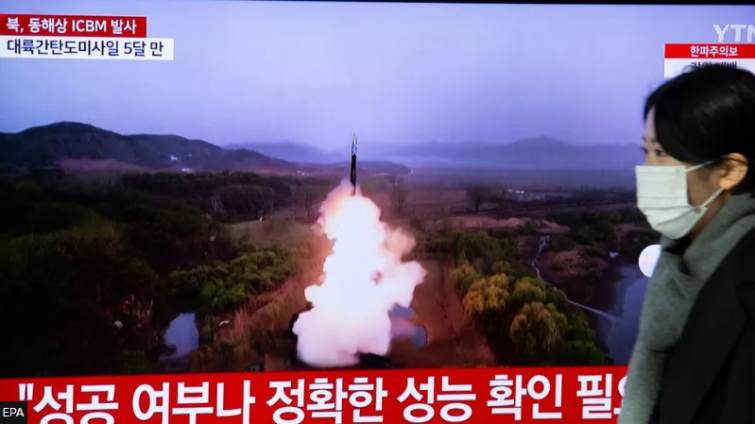North Korea has fired its most advanced long-range missile, South Korean authorities confirm, defying UN curbs.
The launch of the solid-fuel intercontinental ballistic missile drew immediate condemnation from the West. It landed west of Hokkaido in Japan.
It comes after South Korean and US defence officials met last week to update plans on how to respond to a nuclear attack from the North.
Pyongyang had said in response it would take "more offensive countermeasures".
The isolated state launched the long-range missile on Monday morning about 08:24 local time (23:24 Sunday GMT) from the Pyongyang area.
South Korean and Japanese officials said the missile travelled for 73 minutes, covering about 1,000km (621 miles).
ICBMs have the range to reach the North American continent. Monday's launch is North Korea's fifth successful launch of an ICBM this year.
Tensions between the North and the South flared last month when Pyongyang successfully launched a spy satellite into orbit, in violation of United Nations sanctions.
Seoul responded by partially suspending a military agreement with the North that was meant to limit military activity along the border and reduce the likelihood of clashes.
Pyongyang then withdrew from the agreement entirely. North Korea has since rearmed its soldiers in previously unarmed areas of the Demilitarised Zone.
Last week, South Korea's national security advisor Kim Tae-hyo said he was expecting the North to launch an ICBM at some point in December.
On Monday, South Korean national security officials confirmed the ICBM launched was a solid-fuel missile. Such missiles can be fired with less warning, as they do not need to be fuelled prior to launch.
The North had tested its Hwasong-18 missile in July following a first successful flight in April.
North Korea is also working to develop a new solid-fuel medium-range ballistic missile. Last month it claimed to have successfully tested the engine, but the missile had not yet been successfully launched.
As North Korea continues to refine and add to its arsenal of nuclear weapons, South Korea and the United States are stepping up their defence of the region.
In a meeting in Washington on Friday, officials updated their contingency plans for how to respond to a North Korean nuclear attack. The two countries also agreed to war-game the use of nuclear weapons in their military exercises next summer.
Latest Stories
-
Customs cautions public against bringing vehicles without manifest to Ghana
15 minutes -
Many children do not know they have eye problems – Coordinator
22 minutes -
Ghana welcomes Europe-Iran diplomatic thaw, urges Israel to join talks
30 minutes -
CCMA to demolish all dilapidated buildings in Cape Coast – Mayor
43 minutes -
Tunisia sentences ex-President Marzouki to 22 years in absentia
1 hour -
New disability hub in Ho offers life-changing support for residents
1 hour -
Karpowership Ghana wins double honours at 7th HESS Awards
2 hours -
Armed men on motorbikes kill 34 Niger soldiers, ministry says
2 hours -
Police arrest suspect exposed by CCTV footage
2 hours -
The presidential feud that even death couldn’t end
2 hours -
Hundreds of Voice of America reporters fired as Trump guts outlet
2 hours -
Gov’t directs NACOC to operationalise Substance Use Disorder Rehabilitation Fund
3 hours -
TDC Board tours project sites, reviews progress and future development plans
3 hours -
Navrongo traditional leaders urge Mahama to intervene in looming chieftaincy crisis
3 hours -
Iran–Israel war: Dissecting Netanyahu’s political calculus
3 hours

